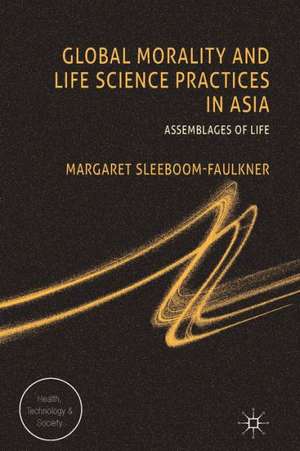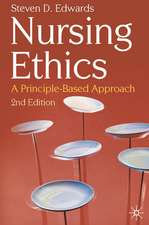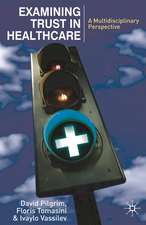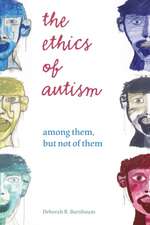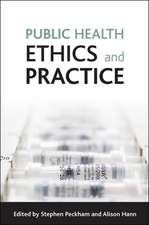Global Morality and Life Science Practices in Asia: Assemblages of Life: Health, Technology and Society
Autor M. Sleeboom-Faulkneren Limba Engleză Hardback – 25 apr 2014
| Toate formatele și edițiile | Preț | Express |
|---|---|---|
| Paperback (1) | 386.61 lei 6-8 săpt. | |
| Palgrave Macmillan UK – 2014 | 386.61 lei 6-8 săpt. | |
| Hardback (1) | 370.38 lei 6-8 săpt. | |
| Palgrave Macmillan UK – 25 apr 2014 | 370.38 lei 6-8 săpt. |
Din seria Health, Technology and Society
-
 Preț: 280.10 lei
Preț: 280.10 lei - 5%
 Preț: 716.09 lei
Preț: 716.09 lei - 5%
 Preț: 841.37 lei
Preț: 841.37 lei - 18%
 Preț: 895.58 lei
Preț: 895.58 lei - 15%
 Preț: 642.51 lei
Preț: 642.51 lei - 18%
 Preț: 781.00 lei
Preț: 781.00 lei -
 Preț: 385.84 lei
Preț: 385.84 lei -
 Preț: 391.22 lei
Preț: 391.22 lei -
 Preț: 423.84 lei
Preț: 423.84 lei -
 Preț: 390.46 lei
Preț: 390.46 lei - 5%
 Preț: 458.23 lei
Preț: 458.23 lei - 5%
 Preț: 719.19 lei
Preț: 719.19 lei - 15%
 Preț: 584.92 lei
Preț: 584.92 lei - 5%
 Preț: 372.97 lei
Preț: 372.97 lei - 5%
 Preț: 717.00 lei
Preț: 717.00 lei - 15%
 Preț: 639.73 lei
Preț: 639.73 lei - 15%
 Preț: 640.24 lei
Preț: 640.24 lei -
 Preț: 392.60 lei
Preț: 392.60 lei - 15%
 Preț: 640.88 lei
Preț: 640.88 lei -
 Preț: 388.13 lei
Preț: 388.13 lei - 5%
 Preț: 725.96 lei
Preț: 725.96 lei - 5%
 Preț: 462.63 lei
Preț: 462.63 lei -
 Preț: 389.88 lei
Preț: 389.88 lei -
 Preț: 387.75 lei
Preț: 387.75 lei - 15%
 Preț: 635.80 lei
Preț: 635.80 lei - 18%
 Preț: 786.36 lei
Preț: 786.36 lei - 15%
 Preț: 641.71 lei
Preț: 641.71 lei - 5%
 Preț: 368.37 lei
Preț: 368.37 lei - 18%
 Preț: 786.66 lei
Preț: 786.66 lei - 5%
 Preț: 366.56 lei
Preț: 366.56 lei -
 Preț: 384.86 lei
Preț: 384.86 lei
Preț: 370.38 lei
Preț vechi: 389.88 lei
-5% Nou
Puncte Express: 556
Preț estimativ în valută:
70.89€ • 74.48$ • 59.58£
70.89€ • 74.48$ • 59.58£
Carte tipărită la comandă
Livrare economică 11-25 martie
Preluare comenzi: 021 569.72.76
Specificații
ISBN-13: 9780230274839
ISBN-10: 0230274838
Pagini: 242
Ilustrații: IX, 242 p.
Dimensiuni: 140 x 216 x 23 mm
Greutate: 0.46 kg
Ediția:2014
Editura: Palgrave Macmillan UK
Colecția Palgrave Macmillan
Seria Health, Technology and Society
Locul publicării:London, United Kingdom
ISBN-10: 0230274838
Pagini: 242
Ilustrații: IX, 242 p.
Dimensiuni: 140 x 216 x 23 mm
Greutate: 0.46 kg
Ediția:2014
Editura: Palgrave Macmillan UK
Colecția Palgrave Macmillan
Seria Health, Technology and Society
Locul publicării:London, United Kingdom
Cuprins
1. Introduction: From Global Moral Economy to Assemblages of Life 2. Reassembling Populations: Questions of Eugenics in China, India and Japan 3. Biopower and Life Assemblages: Genetic Carrier Testing in India, China and Japan 4. Human Genetic Biobanking and Life Assemblages in Asia: Transnational Moral Economies of Health, Progress and Exploitation 5. Life Assemblages of Human Embryonic Stem Cell Research in China and Japan: Bioethical Problematisations and Bioethical Boundary Making 6. Scientists and Publics in East Asian Life Assemblages: Risk, Debate and the Professionalization of Bioethics 7. Life Assemblages and Bionetworking: Developments in Experimental Stem Cell Therapies in India and Japan 8. Reframing the Global Moral Economy of Biotech in Asia: Life Assemblages and Research Objects
Recenzii
"Universalistic claims about the politics of life are challenged by this ambitious book on actual life science practices in Asia.
Margaret Sleeboom-Faulkner, sometimes with Asian co-authors, has gathered together case studies on the practice of human population genomics, reproductive medicine, stem cells research in the region. Drawing on ethnographic study of labs and clinics in Japan, China, S. Korea, and India, the book presents each case study as shaped by a particular "life assemblage" of technological, moral, and political forces in the country. Asian scientists, the book argues, are designing new experiments in the midst of conflicting moral and economic goals of science development, thus forming "local" conditions of life governance.
This volume is an ideal textbook that expands our understanding of how Asian sites have become global players in configuring the ethics and the politics of the life sciences today." - Aihwa Ong, Professor of Socio-cultural Anthropology, Berkeley University, US.
"In this book Sleeboom-Faulkner brings together her extensive field experience in China, India and Japan with a comprehensive overview of recent theoretical approaches to the growth of biotechnology and bioethics. The result is an illuminating account of local engagement with novel, life-changing technologies in contexts and constituencies very different from those found in the West. Around 17 well-argued case studies, an argument is developed about theways in which bioethical capacity is being built in step with biotechnological developments across Asia. Through a careful analysis of the many voices that the ethics of the life sciences bring into play, the book focuses attention on contests and controversies over authority that arise in different economic, political and cultural settings, and how these determine what constitutes a 'life worth living'. This analysis succeeds in exposing the fine grain that lies beneath the universal rhetoric of science, technology and bioethics, and is something of a landmark in this important and burgeoning field." Bob Simpson, Professor of Anthropology, University of Durham, UK.
Margaret Sleeboom-Faulkner, sometimes with Asian co-authors, has gathered together case studies on the practice of human population genomics, reproductive medicine, stem cells research in the region. Drawing on ethnographic study of labs and clinics in Japan, China, S. Korea, and India, the book presents each case study as shaped by a particular "life assemblage" of technological, moral, and political forces in the country. Asian scientists, the book argues, are designing new experiments in the midst of conflicting moral and economic goals of science development, thus forming "local" conditions of life governance.
This volume is an ideal textbook that expands our understanding of how Asian sites have become global players in configuring the ethics and the politics of the life sciences today." - Aihwa Ong, Professor of Socio-cultural Anthropology, Berkeley University, US.
"In this book Sleeboom-Faulkner brings together her extensive field experience in China, India and Japan with a comprehensive overview of recent theoretical approaches to the growth of biotechnology and bioethics. The result is an illuminating account of local engagement with novel, life-changing technologies in contexts and constituencies very different from those found in the West. Around 17 well-argued case studies, an argument is developed about theways in which bioethical capacity is being built in step with biotechnological developments across Asia. Through a careful analysis of the many voices that the ethics of the life sciences bring into play, the book focuses attention on contests and controversies over authority that arise in different economic, political and cultural settings, and how these determine what constitutes a 'life worth living'. This analysis succeeds in exposing the fine grain that lies beneath the universal rhetoric of science, technology and bioethics, and is something of a landmark in this important and burgeoning field." Bob Simpson, Professor of Anthropology, University of Durham, UK.
Notă biografică
Margaret Sleeboom-Faulkner is Professor of Anthropology at the University of Sussex, UK.
